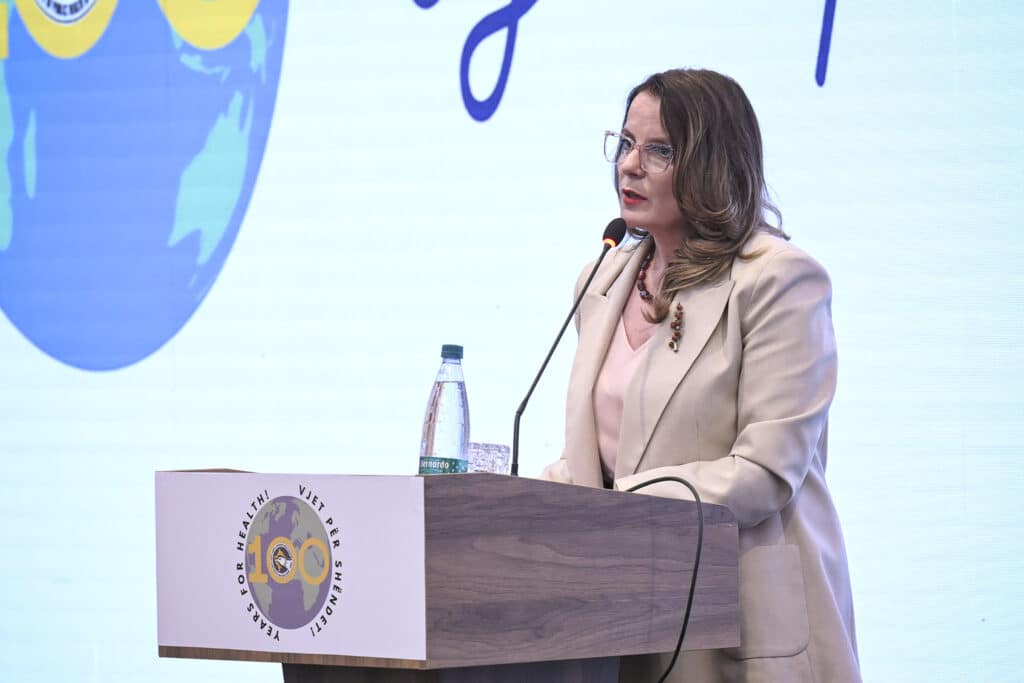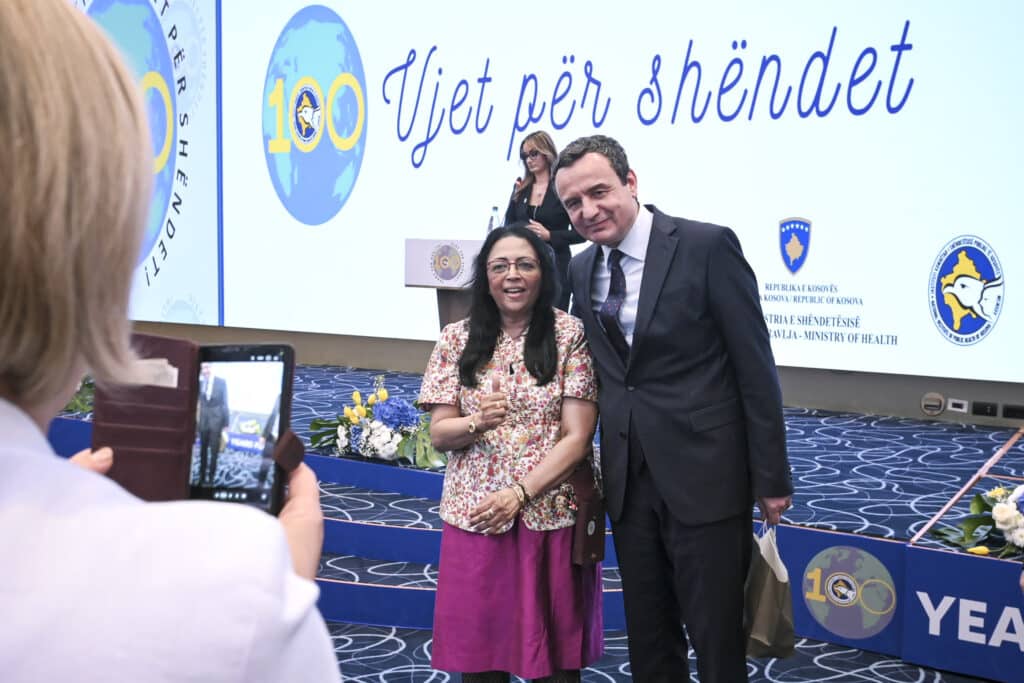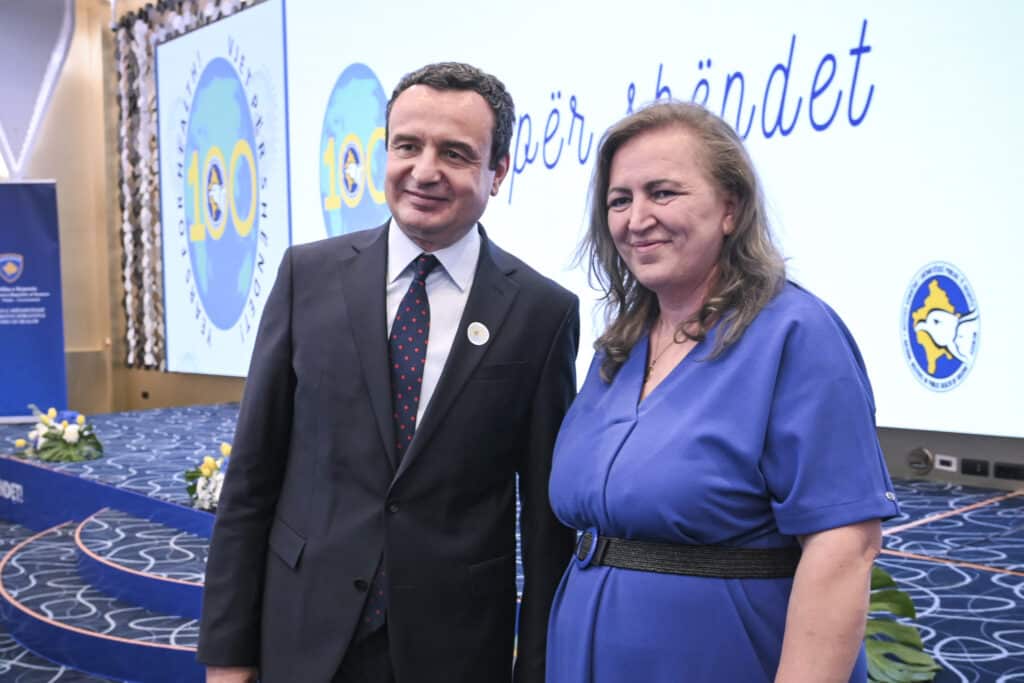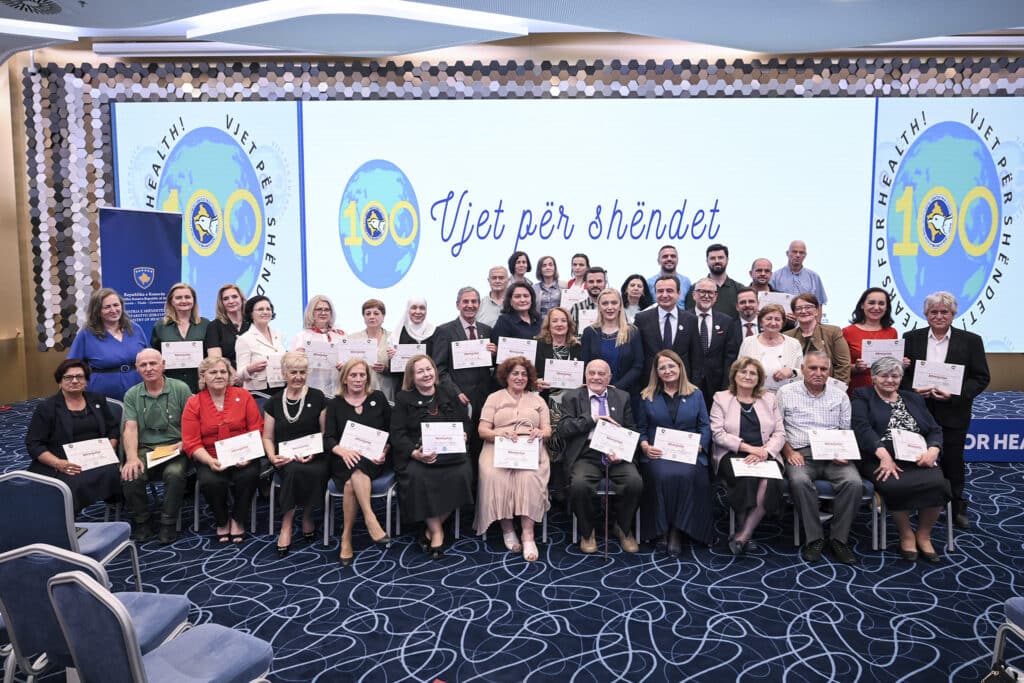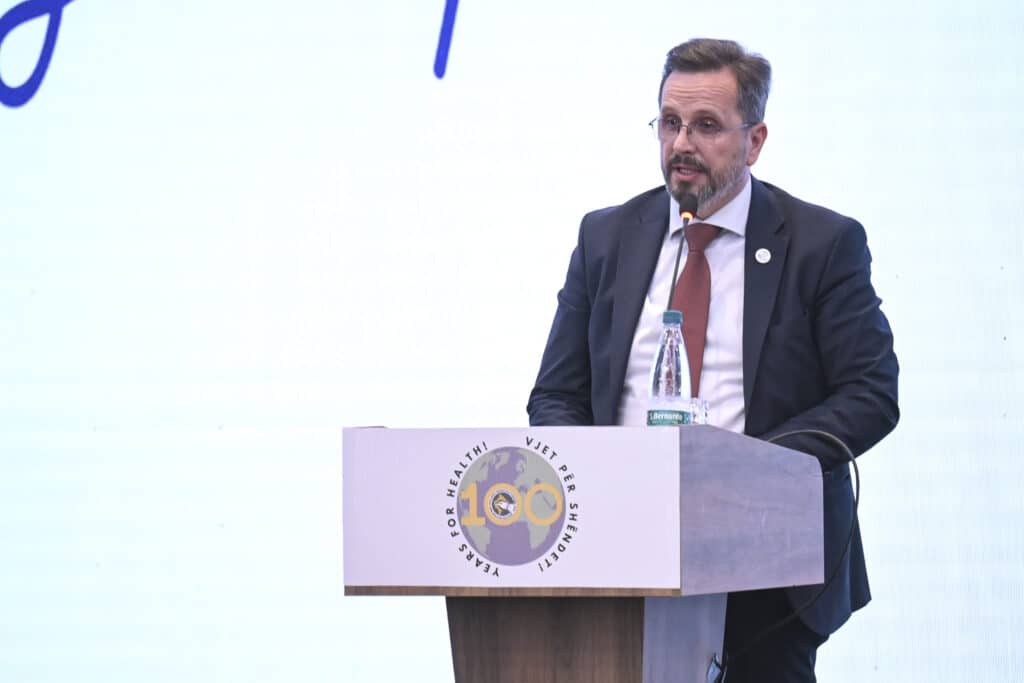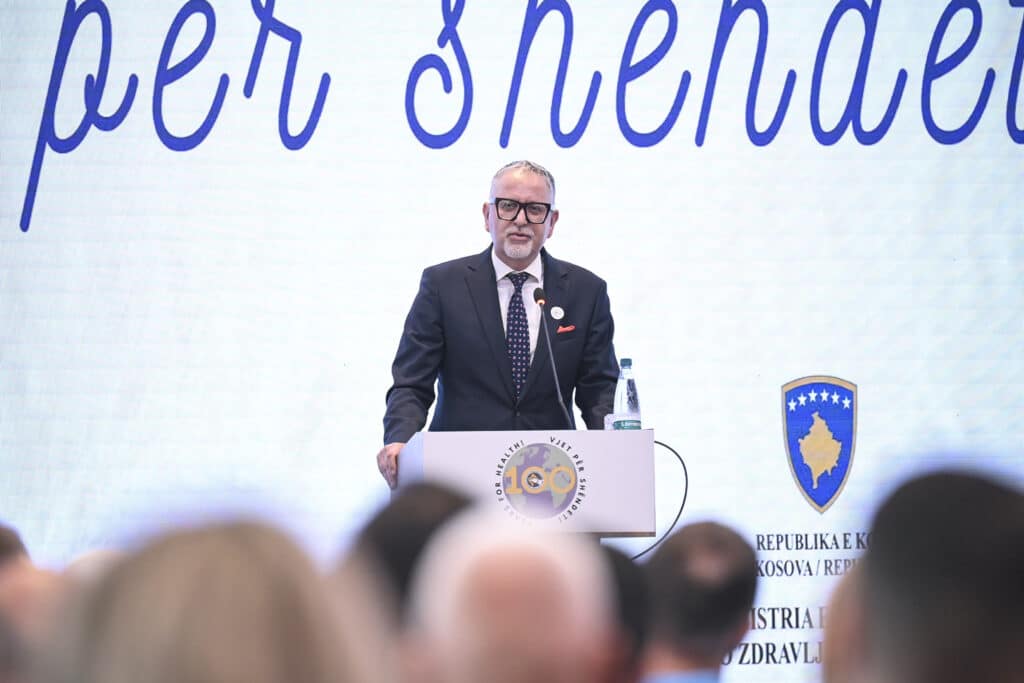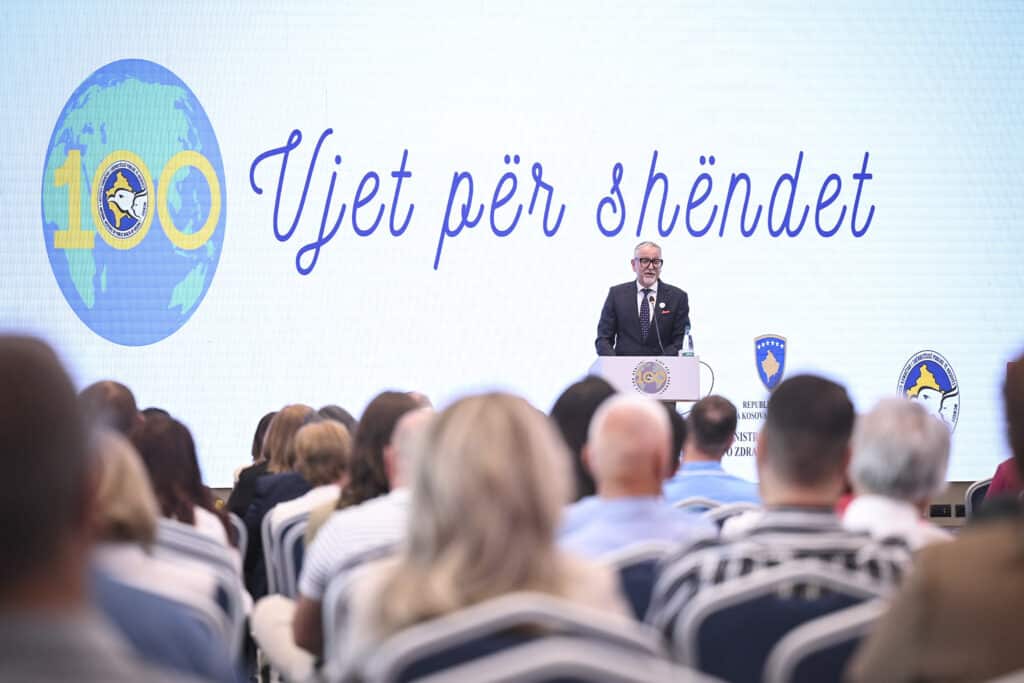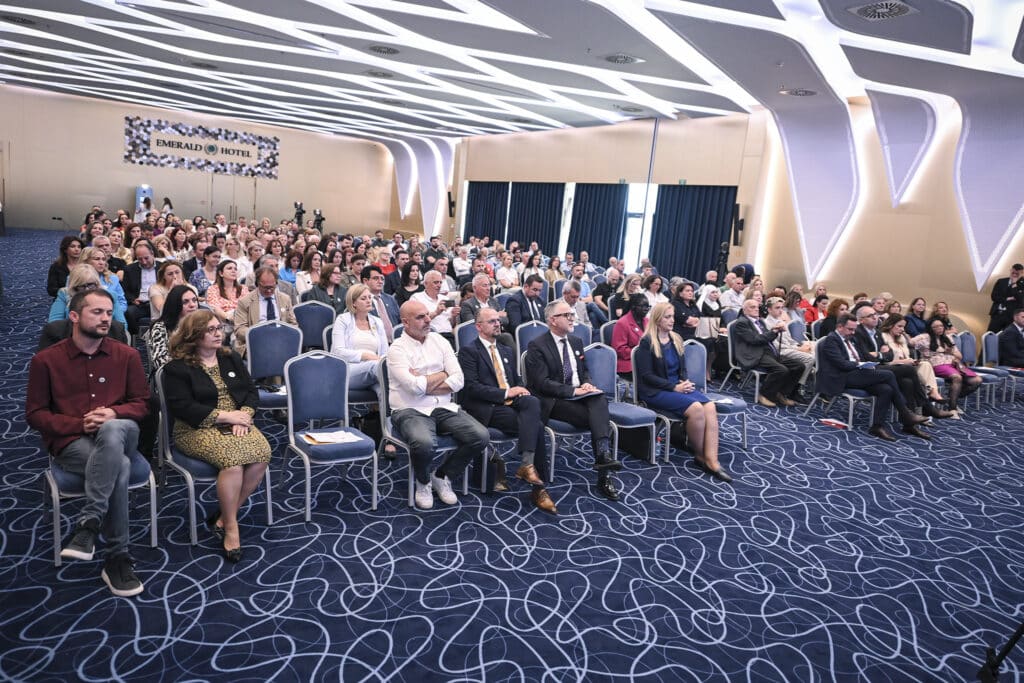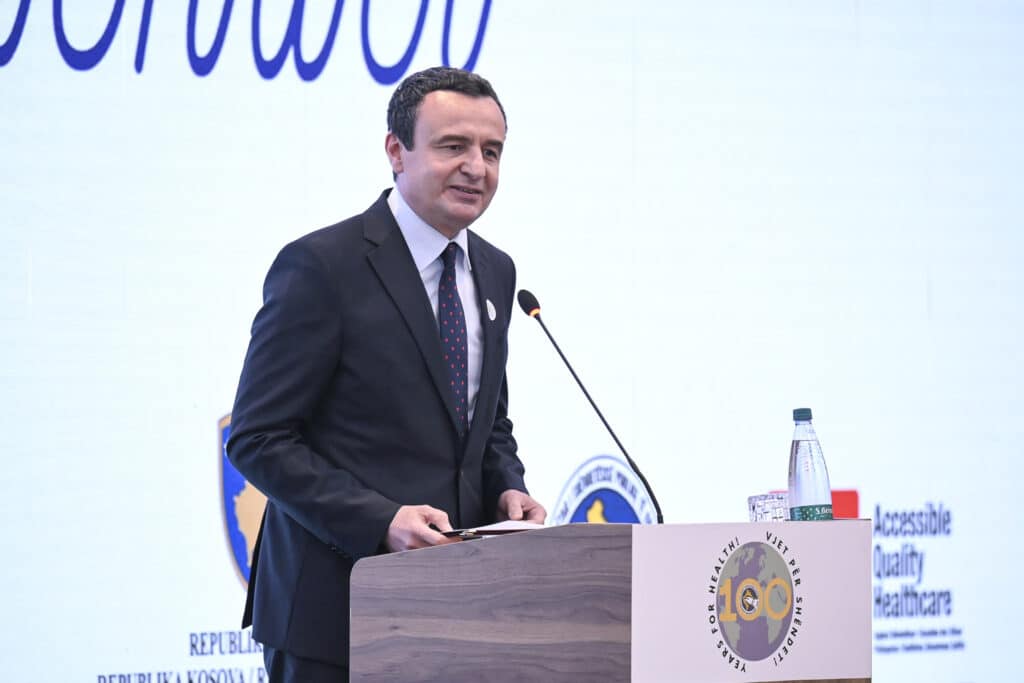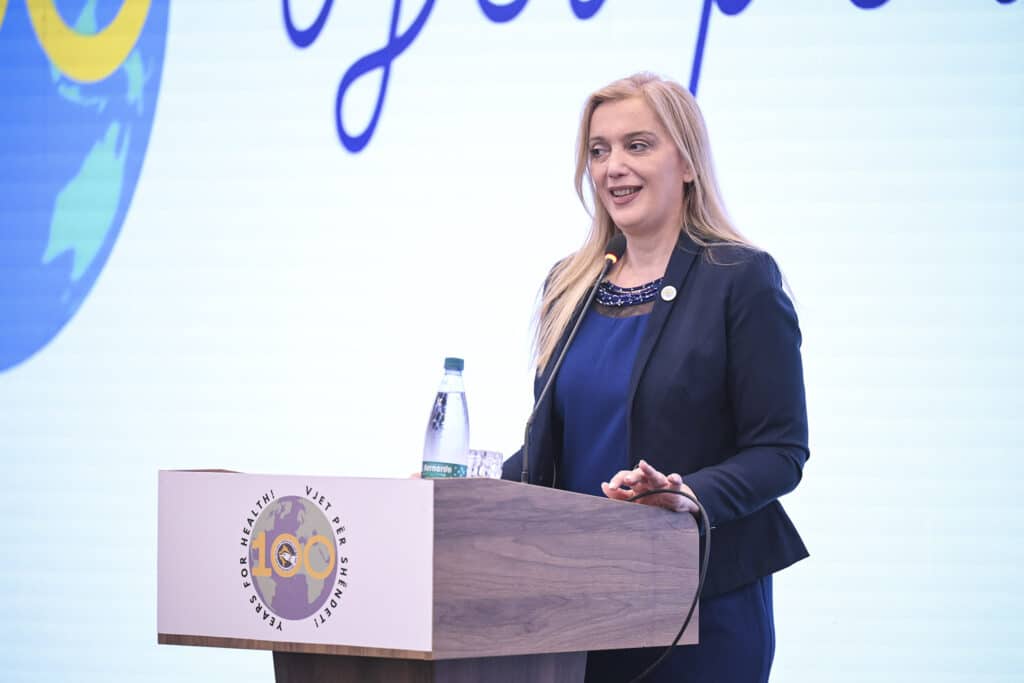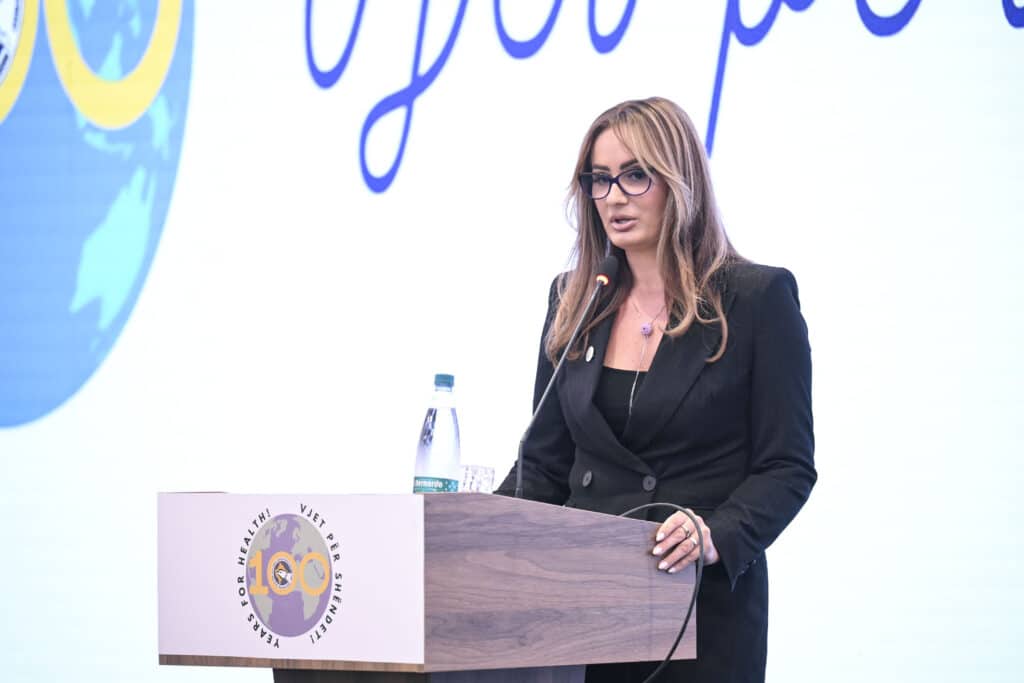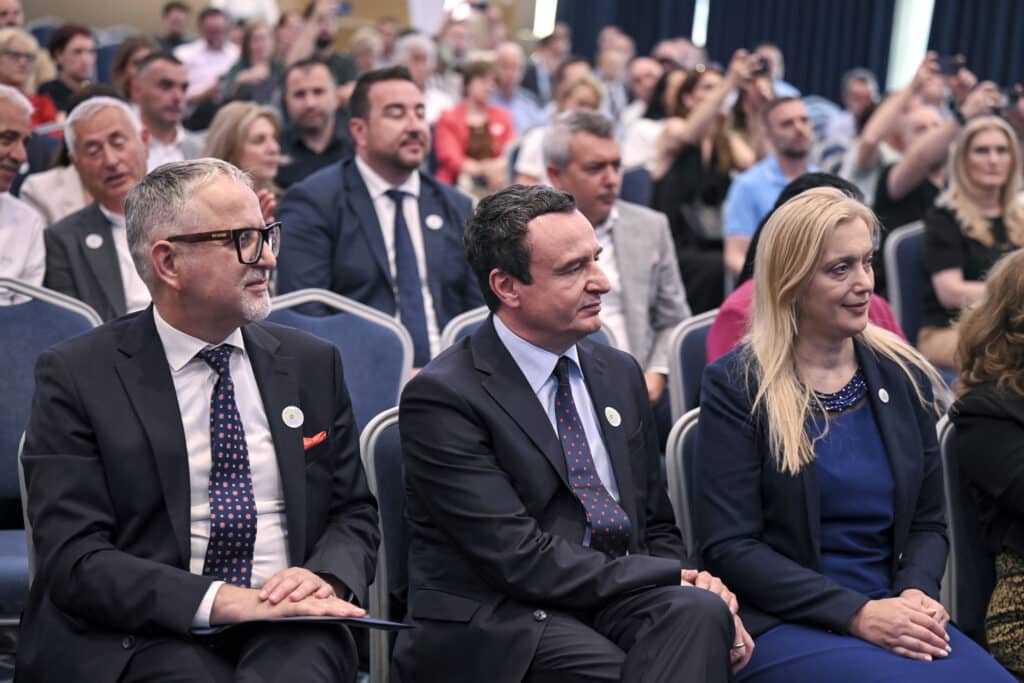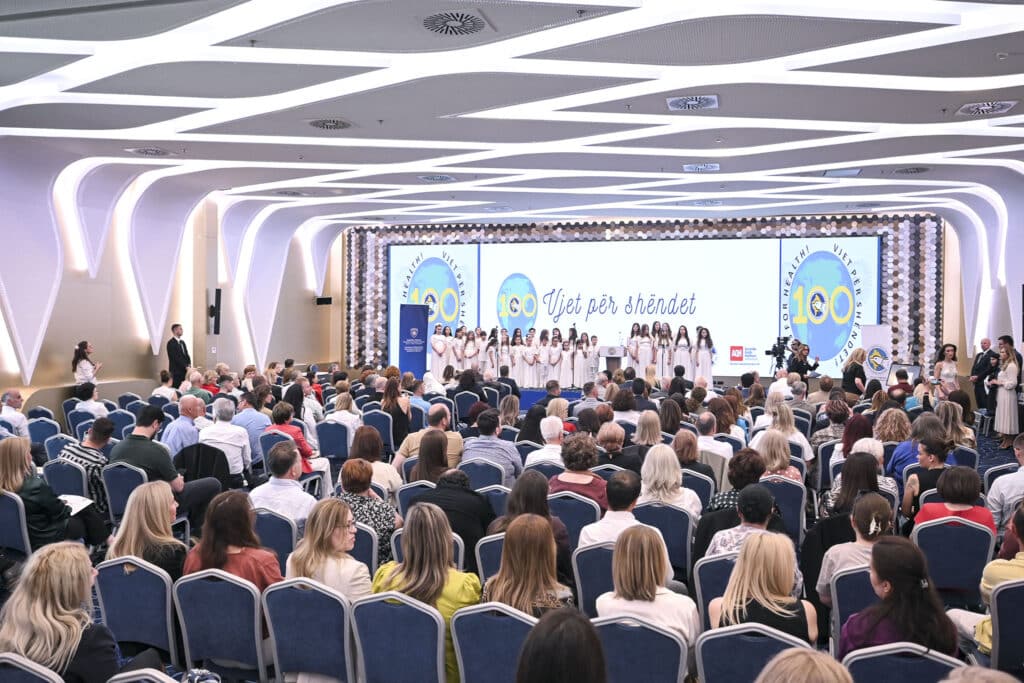Prishtina, June 5, 2025
The acting Prime Minister of the Republic of Kosovo, Albin Kurti, participated in the ceremony organized on the occasion of the 100th anniversary of the establishment of the National Institute of Public Health of Kosovo.
In his speech, the Prime Minister recalled the chronology of the Institute’s founding and its century-long work. From the beginning of June 1925, when the Hygienic-Epidemiological Service was established in Peja, at a time when Albanians in Kosovo lived oppressed in their own lands under the Yugoslav kingdom, until early June 1999, when the last Yugoslavia — the third one under the Milosevic regime — was defeated and expelled from Kosovo, which brought a revival of life in freedom, with the resumption of health institutions’ work, including the Institute, which resumed work with a worthy name and organization.
“These difficulties throughout history produced distinguished cadres from our Institute who laid the foundations of epidemiology services, social medicine, microbiology, human ecology, statistics, and also as professors who raised future generations,” he stated.
The Prime Minister added that over the years, the Institute has played a key role in disease prevention and control, promoting a healthy lifestyle, reducing health inequalities, and ensuring access to quality health care for all, making important strides in improving the health and well-being of our population.
“As a Government, we have and will continue to prioritize investment in healthcare, including public health, in infrastructure such as: building and operationalizing the central vaccine depot, renovating laboratory spaces, investing in Regional Public Health Centers, increasing the number of specialists in public health fields, equipping with modern devices, and establishing an electronic system for collecting and analyzing infectious disease data,” said Prime Minister Kurti, emphasizing that continuous investments in public health infrastructure, research, inter-institutional cooperation, and international collaboration are essential.
He also praised the Institute’s role in responding to the COVID-19 pandemic and its function as a strategic advisor to the Government and Ministry of Health, where through scientific facts, data, and their processing, it assists in evidence-based decision-making, guidance, and the development of health policies for the citizens’ welfare, based on research.
“The Institute serves as a bridge between science and the policies we draft at the Ministry. It is the link between knowledge and experience, serving both citizens and these two: scientific knowledge and institutional experience,” said the Prime Minister.
Meanwhile, the Minister of Health, Arben Vitia, stated that during the COVID-19 pandemic, when the unknown threatened lives and the functioning of health systems, the National Institute of Public Health of Kosovo stood on the front lines, leading epidemiological tracking, testing, reporting, educating and informing citizens, and providing accurate data to the Ministry of Health to make difficult but right decisions. “With continuous support from the Ministry of Health, this institution has been strengthened in every direction: an integrated digital system for infectious disease surveillance has been built, the cold chain for vaccine storage has been modernized, and the immunization calendar has been expanded from 10 to 13 vaccines, including the HPV vaccine, as a concrete step to protect and strengthen the health of children and youth in Kosovo,” he declared.
Full speech of Prime Minister Kurti:
Honorable Mr. Arben Vitia, Minister of Health,
Deputy Minister Dr. Arsim Berisha,
Director of the University Clinical Center of Kosovo, Elvir Aziz,
Honorable Mrs. Ardita Baraku, Director of the National Institute of Public Health of Kosovo,
Honorable Mrs. Eugena Tumini, Director of the Institute of Public Health of Albania,
Honorable Vice-Rector of the University of Prishtina, Dr. Naim Jerliu,
Honorable Dean of the Faculty of Medicine, Dr. Sefedin Muçaj,
Distinguished guests,
Ladies and gentlemen,
We are gathered here today to mark the jubilee, the 100th anniversary of the founding of the National Institute of Public Health of Kosovo.
One century ago, at the beginning of June 1925, the hygienic-epidemiological service of Peja was established, at a time when Albanians in Kosovo lived oppressed on their own lands under the Yugoslav monarchy.
History describes this period as very difficult for all freedom-loving peoples living under the yoke of that dictatorial monarchy, especially for Albanians, whose lands were confiscated through agrarian reforms, who were killed under the pretext of collecting weapons, and expelled from Albania to Turkey as part of ongoing depopulation.
Such a socio-economic and political repression inevitably had its health and epidemiological toll on Albanians in Kosovo.
At the beginning of June 1925, the American philanthropist Rockefeller laid the foundations for the Hygienic-Epidemiological Service in Peja.
Only a few years earlier, with the help of the Rockefeller Foundation and the scientific-professional work of the pioneer of public health, Croatian doctor and scientist Andrija Štampar, the Institute of Social Medicine was established within the Faculty of Medicine in Zagreb, an event that laid the foundations of the discipline of public health globally.
Since then, the Institute’s work has been filled with many difficulties, great efforts, and numerous setbacks. Organized according to Kosovo’s situation and status, the Institute successfully faced the challenges of the times.
Again, in early June 1999, the last Yugoslavia, the third one under Milosevic’s regime, was defeated and expelled from Kosovo. With the revival of our life in freedom, health institutions resumed their work, and the Institute also restarted, with a worthy name and organization for a state that would become independent in less than a decade.
These historical parallels, distinguished guests, clearly outline who we are, which civilization we belong to, and what our orientation as an independent and democratic state should be. Civility and humanism, inclusiveness, and non-discrimination are values that arise from our Western orientation.
These difficulties throughout history produced distinguished cadres from our Institute who laid the foundations of epidemiology services, social medicine, microbiology, human ecology, statistics, and as professors who raised future generations.
Public health is the cornerstone of a developing society. It includes not only the prevention and control of diseases but also the promotion of a healthy lifestyle, reducing health inequalities, and ensuring access to quality healthcare for all without leaving anyone behind. Over the years, this Institute has played a key role in advancing these objectives, making important steps in improving the health and well-being of our population.
Today, reflecting on past years, we see the Institute’s impact on protecting and advancing the health of our citizens, from eradicating and eliminating some infectious diseases, reducing the spread and worsening of diseases in general, mortality reduction, to raising health awareness and ensuring safe water and food.
We also reflect today on achievements and challenges in public health. Public health campaigns have not only raised awareness but also directly improved health outcomes and population longevity.
In recent years, we faced an unprecedented crisis that tested our resilience, healthcare systems, and ability to unite as a community—both citizen immunity and the health system’s immunity. The COVID-19 pandemic challenged us with the unknown, and our response to this public health emergency showed very good results, despite a still generally fragile health system.
On this occasion, I want to commend the commitment of the Institute’s staff. Your dedication, knowledge, passion, and tireless efforts have undoubtedly been the driving force of our common success. Looking ahead, we must remain vigilant because on one hand COVID-19 has not disappeared, and on the other, we must be prepared for new, different future emergencies.
Continuous investments in public health infrastructure, research, inter-institutional cooperation, and international collaboration are essential.
As a government, we have and will continue to prioritize investment in healthcare, including public health, infrastructure such as building and operationalizing the central vaccine depot, renovating laboratory spaces, investing in Regional Public Health Centers, increasing the number of specialists in public health fields, equipping with modern devices, and establishing an electronic system for collecting and analyzing infectious disease data.
It is a well-known success story in the region and the world, an intersectoral collaboration, with the Institute—the Ministry of Health’s agency—at the forefront: Kosovo’s response to the COVID-19 pandemic and the organization of mass vaccination.
In 2021, within a record time, through direct contracting with the manufacturer, we procured the necessary amount of vaccines ourselves. We planned and organized a fully digitized vaccination process that yielded immediate results and laid the foundation for protecting public health.
We applied data science and evidence-based decision-making to implement appropriate measures. As we all know, better than anyone else, we succeeded together. Our success was recognized worldwide and experienced firsthand by our citizens.
Even after this public health emergency, we quintupled the vaccine budget, updating the regular vaccination calendar with the addition of three new vaccines: against pneumococcus (PCV), rotavirus, and human papillomavirus (HPV).
While celebrating this historic centennial moment, it is also a time to look forward to the future. Public health challenges are always evolving, and we must remain adaptable and innovative.
The National Institute of Public Health, through the Ministry, serves the Government and the Republic as a strategic advisor, where through scientific facts, data, and their processing, it assists in evidence-based decision-making, guidance, and the development of health policies for citizens’ welfare, based on research and not on particular empirical data or anecdotal rumors.
In particular, the National Institute of Public Health of Kosovo is the health intelligence, something that becomes even more important in the current context we live in.
Thus, the Institute serves as a bridge between science and the policies we draft at the Ministry. It is the connection of knowledge with experience, serving both citizens and these two: scientific knowledge and institutional experience.
Cooperation with other countries, association, and membership in international health institutions of the Institute is very important, aiming not only to exchange experiences but also to ensure compliance with the highest international standards. Our Institute successfully cooperates with counterpart institutions in other countries, regional and global organizations such as ECDC, CDC, WHO
The National Institute of Public Health of Kosovo is a continuation of a tradition to be envied and an institutional memory built by esteemed professionals. The Institute is not a bureaucratic administration. The National Institute of Public Health of Kosovo is our science and academy in the field of public health.
In closing, I would like to express my heartfelt congratulations to everyone at the National Institute of Public Health. Your achievements over the years are truly commendable, and the Government will remain committed to investing so that together we continue to take important steps in advancing and improving public health for all.
Thank you and congratulations!
